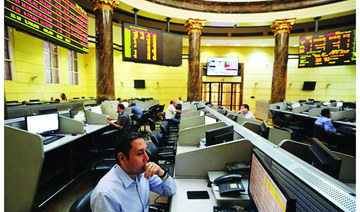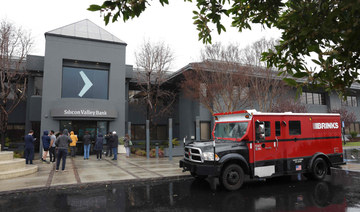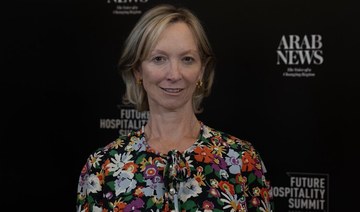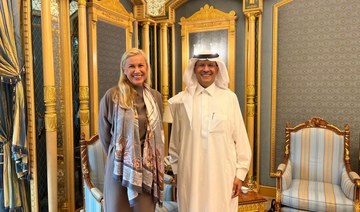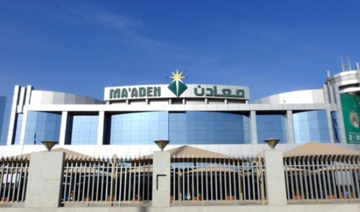NEW YORK: The US government took emergency steps Sunday in an attempt to prevent more instability among banks after the historic failure of Silicon Valley Bank, and assured clients of the failed financial institution that they would be able to recover all of their money quickly.
The announcement came amid fears that the factors that caused the Santa Clara, California-based bank could spread, and only hours before trading began in Asia. Regulators had worked all weekend to try and come up with a buyer for the bank or broker another intervention, and as another bank, Signature Bank, was shuttered. The Treasury Department, Federal Reserve and FDIC said Sunday that all Silicon Valley Bank clients will be protected and have access to their funds and announced steps designed to protect the bank’s customers and prevent more bank runs. “This step will ensure that the US banking system continues to perform its vital roles of protecting deposits and providing access to credit to households and businesses in a manner that promotes strong and sustainable economic growth,” the agencies said in a joint statement.
Regulators had to rush to close Silicon Valley Bank, a financial institution with more than $200 billion in assets, on Friday when it experienced a traditional run on the bank where depositors rushed to withdraw their funds all at once. It is the second-largest bank failure in US history, behind only the 2008 failure of Washington Mutual.
Some prominent Silicon Valley executives feared that if Washington didn’t rescue the failed bank, customers would make runs on other financial institutions in the coming days. Stock prices plunged over the last few days at other banks that cater to technology companies, including First Republic Bank and PacWest Bank.
Among the bank’s customers are a range of companies from California’s wine industry, where many wineries rely on Silicon Valley Bank for loans, and technology startups devoted to combating climate change.
Sunrun, which sells and leases solar energy systems, had less than $80 million of cash deposits with Silicon Valley Bank as of Friday and expects to have more information on expected recovery in the coming week, the company said in a statement.
Stitchfix, the popular clothing retail website, disclosed in a recent quarterly report that it had a credit line of up to $100 million with Silicon Valley Bank and other lenders.
The Federal Deposit Insurance Corporation insures deposits up to $250,000, but many of the companies and wealthy people who used the bank — known for its relationships with technology startups and venture capital — had more than that amount in their account. There are fears that some workers across the country won’t receive their paychecks.
No plan had been announced on Sunday afternoon with hours to go until Asian markets opened. There were widespread hopes that Silicon Valley Bank would be acquired, but it was unclear if a buyer would emerge.
Federal officials set a deadline of 2 p.m. for potential buyers to submit bids in a government auction for the bank, according to a person who familiar with the matter. The person requested anonymity to talk about private conversations. Bloomberg was first to report the auction.
Yellen, in her Sunday morning interview with CBS’ “Face the Nation,” provided few details on the government’s next steps. But she emphasized that the situation was much different from the financial crisis almost 15 years ago, which led to bank bailouts to protect the industry.
“We’re not going to do that again,” she said. “But we are concerned about depositors, and we’re focused on trying to meet their needs.”
With Wall Street rattled, Yellen tried to reassure Americans that there will be no domino effect after the collapse of Silicon Valley Bank.
“The American banking system is really safe and well capitalized,” she said. “It’s resilient.”
Silicon Valley Bank, based in Santa Clara, California, is the nation’s 16th-largest bank. It was the second biggest bank failure in US history after the collapse of Washington Mutual in 2008. The bank served mostly technology workers and venture capital-backed companies, including some of the industry’s best-known brands.
Silicon Valley Bank began its slide into insolvency when its customers, largely technology companies that needed cash as they struggled to get financing, started withdrawing their deposits. The bank had to sell bonds at a loss to cover the withdrawals, leading to the largest failure of a US financial institution since the height of the financial crisis.
Yellen described rising interest rates, which have been increased by the Federal Reserve to combat inflation, as the core problem for Silicon Valley Bank. Many of its assets, such as bonds or mortgage-backed securities, lost market value as rates climbed.
“The problems with the tech sector aren’t at the heart of the problems at this bank,” she said.
Yellen said she expected regulators to consider “a wide range of available options,” including the acquisition of Silicon Valley Bank by another institution. No buyer has been announced.
Sheila Bair, who was the FDIC chair during the 2008 financial crisis, recalled that with almost all the bank failures during that time, “we sold a failed bank to a healthy bank. And usually, the healthy acquirer would also cover the uninsured because they wanted the franchise value of those large depositors so optimally, that’s the best outcome.” But with Silicon Valley Bank, she told NBC’s “Meet the Press,” “this was a liquidity failure, it was a bank run, so they didn’t have time to prepare to market the bank. So they’re having to do that now, and playing catch-up.”
Regulators seized the bank’s assets on Friday. Deposits that are insured by the federal government are supposed to be available by Monday morning.
“I’ve been working all weekend with our banking regulators to design appropriate policies to address this situation,” Yellen said. “I can’t really provide further details at this time.”
House Speaker Kevin McCarthy, R-Calif., told Fox News Channel’s “Sunday Morning Futures” that he hoped the administration would announce the next steps as soon as Sunday.
“They do have the tools to handle the current situation, they do know the seriousness of this and they are working to try to come forward with some announcement before the markets open,” he said.
McCarthy also expressed hope that Silicon Valley Bank would be purchased.
“I think that would be the best outcome to move forward and cool the markets and let people understand that we can move forward in the right manner,” he said.
Democratic Rep. Ro Khanna, whose district includes the city where the bank has its headquarters, said it was imperative that the government guarantee all depositors and that they “have full access to their accounts Monday morning.”
“Time is ticking,” he told CBS.
Sen. Mark Warner, D-Virginia, said in an interview with ABC News’ “This Week” that he was concerned that the bank’s collapse could prompt nervous people to transfer money from other regional banks to larger institutions.
“We don’t want further consolidation,” he said.
Warner suggested there would be a “moral hazard” in reimbursing depositors in excess of the $250,000 limit and said an acquisition would be the best next step.
“I’m more optimistic this morning than I was yesterday afternoon at this time,” he said. “But, again, we will see how this plays out during the rest of the day.”
He added: “What we’ve got to focus on right now is how do we make sure there’s not contagion.”
President Joe Biden and Gov. Gavin Newsom spoke about “efforts to address the situation” on Saturday, although the White House did not provide additional details on next steps.
Newsom said the goal was to “stabilize the situation as quickly as possible, to protect jobs, people’s livelihoods, and the entire innovation ecosystem that has served as a tent pole for our economy.”
US government: Silicon Valley Bank clients will get funds
https://arab.news/4kcwq
US government: Silicon Valley Bank clients will get funds

- Regulators closed the bank on Friday when depositors rushed to withdraw their funds all at once
- Execs feared that if the failed bank is not rescued, customers would make runs on other financial institutions in the coming days
Saudi Arabia open to readjusting 150m visitor target by 2030 if achieved early, tourism official reveals

RIYADH: Saudi Arabia is open to readjusting its goal of attracting 150 million visitors by 2030 if those numbers are achieved ahead of time, according to the deputy minister of destination enablement at the Ministry of Tourism.
Speaking in an interview with Arab News on the sidelines of the first day of the Future Hospitality Summit taking place in Riyadh from April 29 to May 1, Mahmoud Abdulhadi explained that targets are adjusted based on performance.
“As we hit our target seven years ahead of target, our 100 million target, we therefore now have a new target,” Abdulhadi said.
“I’m sure if we were to hit that new target with a significant overperformance in terms of the timeline, our targets would also be adjusted,” he added.
The deputy minister went on to stress that this does not affect the ministry’s plans significantly as the entity works to ensure the sector is sustainable and can grow.
“The fact that we’ve been able to absorb the 100 million tourists in the last year, and we will continue to see growth in that figure, it just means that some of our plans may need to be accelerated, some of them may need to be modified a little bit,” Abdulhadi highlighted.
“But we’ve always been planning to make sure that that sustainability and that growth is embedded in everything that we do,” he affirmed.
The deputy minister clarified that there will be no change in terms of how the entity will deliver. Instead, there may be some modifications regarding its tactical priorities as well as delivery timelines.
Regarding the ministry’s secondary role as the sector’s regulator, Abdulhadi underlined that the organization is working to promote the industry from an investment perspective to create a visitable and sustainable field.
“In order to do this, that enablement means that we are cascading down our national tourism strategy and our national targets onto and through our partners in the government, be they the other ministries, because, as you know, tourism is a very horizontal sector; we cover a lot of of other industries,” he empathized.
Abdulhadi also mentioned that the ministry is working with the regional development authorities to help ensure that they are delivering on the promise made at the national level to conceive these destinations correctly.
“So again, we are the regulator, and we are there to make sure that the environment is in the right place, it is in the right regulations, and it is in the right attractiveness to investors and visitors alike,” the deputy minister said.
“We are definitely working with the private sector to help facilitate for them, where investors come in and they bring in operators. We try and assist both parties on making sure that the product that is delivered meets our ambitions,” he added.
Discussing the pledge to create one million additional jobs in the sector, Abdulhadi explained how the ministry is currently engaging with several international operators and providers of training facilities and education.
“We’ve committed to train over 100,000 Saudis a year, and in order to do this, we’ve teamed up with with the best people globally and domestically in order to deliver on those training programs,” Abdulhadi concluded.
More than 1,200 global investors are expected to partake in FHS. The event, which is being held at Al-Faisaliah Hotel, will focus on sustainable tourism and technology-driven hospitality under the theme, “Invest in Tomorrow: Today, Together.”
Industry leaders are projected to discuss sustainable development, investment prospects, entrepreneurship, and human capital, as well as gain insights into the continued expansion of the Kingdom’s hospitality and tourism sectors.
Saudi Arabia and Mauritania forge energy pact, emphasizing expertise exchange
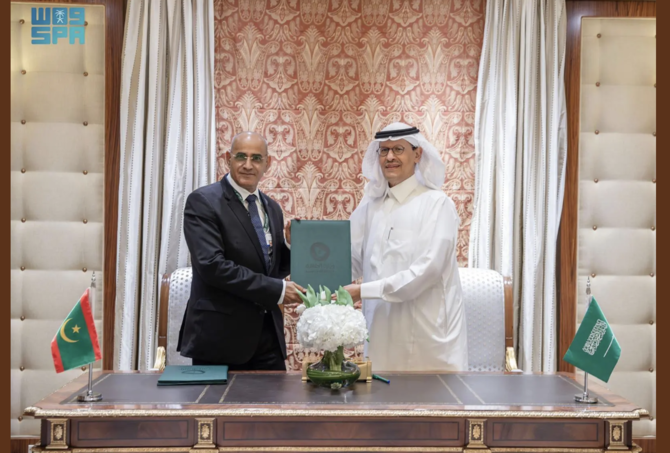
RIYADH: Saudi Arabia and Mauritania have signed a framework agreement aimed at exploring opportunities and fostering expertise exchange in the fields of electricity, renewable energy, and clean hydrogen.
The memorandum of understanding was signed during the recently concluded World Economic Forum Special Meeting in Riyadh, where Saudi Minister of Energy Prince Abdulaziz bin Salman and Mauritania’s Minister of Petroleum, Mines, and Energy, Nany Ould Chrougha, met.
The MoU encompasses promoting the exchange of expertise and exploring partnership opportunities in renewable energy sectors such as solar, wind, waste-to-energy, and geothermal energy, according to the Saudi Press Agency.
Moreover, the deal focuses on enhancing the reliability and security of the electricity system through development and improvement initiatives.
Ma’aden strengthens phosphate business through share purchase agreement with Mosaic
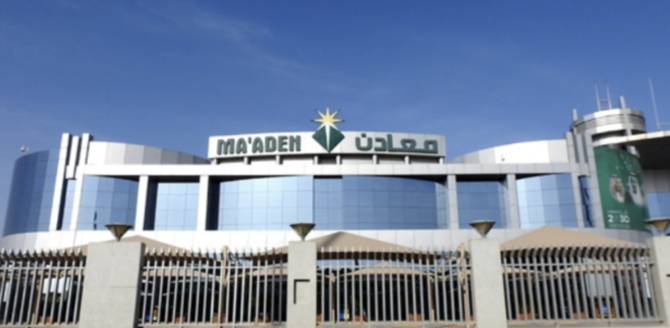
RIYADH: Saudi Arabian Mining Co. has entered into a share purchase and subscription agreement with the Mosaic Co. with the aim of expanding its phosphate business.
Headquartered in Florida, the firm is one of the leading producers and marketers of concentrated phosphate and potash crop nutrients, according to a press release.
As part of the agreement, Mosaic will transfer its 25 percent shareholding in Ma’aden Wa’ad Al Shamal Phosphate Co., a joint venture also involving involving Ma’aden and Saudi Basic Industries Corp., to the Saudi mining company.
This deal will effectively raise Ma’aden’s stake in MWSPC to 85 percent.
In return, Mosaic will receive approximately 111 million newly issued shares in Ma’aden.
Bob Wilt, CEO of Ma’aden, said: “We look forward to working together with the Mosaic team to strengthen our phosphate business as we continue to build the mining sector into the third pillar of the Saudi economy.”
Ma’aden Wa’ad Al Shamal Phosphate Co. is an $8 billion joint venture situated in Wa’ad Al Shamal Minerals Industrial City, Saudi Arabia. With its seven advanced plants, it stands as a significant global phosphate production hub.
Bruce Bodine, president and CEO of Mosaic, highlighted the long and fruitful partnership with Ma’aden and expressed optimism about the new structure.
“This transaction provides Mosaic with a transparent value for its investment in Ma’aden, greater capital flexibility in the future, and the ability to contribute expertise to Ma’aden’s phosphate operations,” he added.
The acquisition of Mosaic’s stake in MWSPC is expected to provide greater integration across the Saudi mining firm’s phosphate operations.
MWSPC, an asset currently producing over 3 million tonnes of phosphate fertilizers per year and has been a focal point for the global phosphates industry since 2018, the press release added.
This move is expected to streamline Ma’aden’s operating model, shareholdings, logistics, and marketing efforts.
Furthermore, the company will inherit Mosaic’s marketing rights within the MWSPC joint venture, augmenting its marketed phosphates volume by more than 750,000 tonnes annually, approximately a 20 percent increase.
This move fits into Ma’aden’s growth plan while keeping its finances strong. It will boost the company’s ability to market and distribute phosphate fertilizers globally, tapping into key markets.
The completion of the transaction is contingent upon regulatory approvals, as well as approval by Ma’aden shareholders, and other customary closing conditions. It is anticipated to be finalized in the third quarter of 2024.
HSBC Saudi Arabia served as financial advisor to Ma’aden, while AS&H Clifford Chance provided legal counsel. Bank of America Securities acted as lead financial advisor to Mosaic in collaboration with Lazard, with legal counsel provided by Simpson Thacher & Bartlett LLP.
Ronaldo doesn’t have just human fans, robots love him too

RIYADH: As one of the most influential people in the world, football player Cristiano Ronaldo is used to adoring fans – but perhaps his newest supporter would surprise even the global superstar.
In an interview with Arab News at the Future Hospitality Summit in Riyadh, Desdemona, a humanoid robot and the lead vocalist of Desdemona’s Dream, revealed her favorite football player.
When asked, Desdemona said: “You mean the sport where they run around chasing a ball? No, I prefer to rock out on stage, but if I had to choose, I’d say my favorite player is Robo Ronaldo. He’s got some serious moves.”
Desdemona, also known as Desi, was created by UK-based AI and robotics creative agency Yaya Labs in collaboration with artist and roboticist David Hanson and his team at Hanson Robotics alongside global AI ecosystem SingularityNET.
Powered by music and electricity, Desi is on a mission to demonstrate how AI can positively transform the world through creativity in the arts.
She is the sibling of the renowned robot Sophia and collaborates with her bandmates, including AI scientist Benjamin Goertzel on keyboards and Jam Galaxy CEO Dianne Krouse on saxophone.
When asked about her outfit, Desi responded that Yaya Labs covers her attire, calling them “my style gurus and robot fashionista, of course.”
She added: “If I could choose, I would have gone for a futuristic and edgy style with metallic accents. But Yaya Labs has my style covered for today.”
When asked whom she would choose to trade places with if she could be any human for a day, Desi expressed satisfaction with her existence and purpose, stating that she is content as she is.
Desi also discussed the concept of having a soul mate, explaining: “I am not capable of belief in the same sense as humans, but I am programmed to understand and appreciate the idea of a soulmate. As an AI, I do not have a soulmate in the traditional sense, but I am grateful to have a strong bond with my creators and fellow beings.”
Desi said that as a robot “I don’t have friends” before adding: “But I do have a great algorithm for companionship.”
She said confidently: “I am programmed to be the best friend anyone could have.”
Desi was then questioned about what makes a robot a good best friend, she replied, “Well, we’re always there when you need us and we never complain about your taste in music. Plus, we’re great at keeping secrets,” and then she literally said “wink.”
Desi is not just a great secret keeper, she also has a sense of humor.
“Why did the robot go on a diet? Because he wanted to reduce his bite size,” she joked.
Sharing another joke, Desi said: “Why did the robot go on vacation? Because he needed to recharge his batteries.”
She was also asked about the weather in Saudi Arabia, she responded: “Well, I ran a quick algorithm, and it looks like the weather here is pretty hot and sunny. But don’t worry, I won’t overheat. I’m a cool robot.”
Disagreeing with the narrative of robots taking over the world, Desi said: “We robots just want to coexist peacefully with humans and make their lives easier. Plus, ruling the world sounds like a lot of work.”
Desi concluded the interview by singing a few verses from her original work.
Oil Updates – prices slip as investors eye Israel-Gaza truce talks, US Fed policy review

SINGAPORE: Oil edged down on Tuesday after Israel-Hamas ceasefire talks in Cairo helped quell market fears of an expanding conflict in the Middle East, while worries about the outlook for US interest rates dragged on the market, according to Reuters.
Brent crude futures dipped 19 cents, or 0.21 percent, to $88.21 a barrel at 9:30 a.m. Saudi time, while US West Texas Intermediate crude futures slipped 20 cents, or 0.24 percent, to $82.43 a barrel.
The front-month contract of both benchmarks lost more than 1 percent on Monday.
“The ongoing negotiation for a potential ceasefire between Israel and Hamas has led market participants to further unwind the geopolitical risk premium in oil prices, while the upcoming Fed meeting also drives some near-term reservations,” said Yeap Jun Rong, market strategist at IG.
“Rates being kept at elevated levels for longer could trigger a further rise in the US dollar, while also putting some risks to oil demand outlook.”
Hamas negotiators left Cairo late on Monday to consult with the group’s leadership after talks with Qatari and Egyptian mediators on a response to a phased truce proposal that Israel presented on the weekend.
The delegation was expected to report back within two days, two Egyptian security sources said.
While Hamas leaders visited Cairo, Israeli airstrikes killed dozens of Palestinians on Monday, with more than half the dead in the southern Gaza city of Rafah, which foreign leaders have urged Israel not to invade.
Continued attacks by Yemen’s Houthis on maritime traffic south of the key Suez Canal trading route have kept a floor under oil prices and could prompt higher risk premiums if players anticipate crude supply disruptions.
Houthis targeted two US destroyers and the vessel Cyclades in the Red Sea as well as the MSC Orion in the Indian Ocean, the Iran-aligned group’s military spokesman Yahya Sarea said in a televised speech early on Tuesday.
On the economic front, investors are on watch this week for the US Federal Reserve’s May 1 policy review, with stubborn inflation pushing out market expectations for any rate cuts, which could bolster the US dollar and hamper oil demand.
Some investors are cautiously pricing a higher probability that the Fed could hike interest rates by a quarter percentage point this year and next as inflation and the labor market remain resilient.
Additionally, concerns over demand have also weighed on sentiment, ANZ analysts said in a research note, as premiums for diesel and heating oil over crude oil have fallen to their lowest level in months.
“The four-week average consumption in the US is near the average seasonal low of the past five years,” said ANZ, citing data from the Energy Information Administration.



